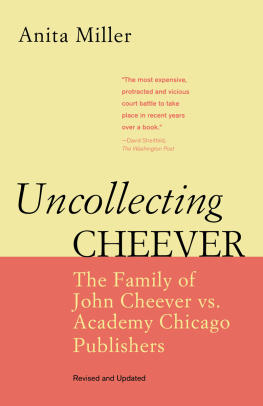FRONTIERS OF FAMILY LAW
Frontiers of Family Law
Edited by
Gareth Miller
Centre for Family Law and Family Policy
The Norwich Law School
University of East Anglia
First published 2003 by Ashgate Publishing
Reissued 2018 by Routledge
2 Park Square, Milton Park, Abingdon, Oxon OX14 4RN
711 Third Avenue, New York, NY 10017, USA
Routledge is an imprint of the Taylor & Francis Group, an informa business
Copyright The Centre for Family Law and Family Policy and the contributors 2003
The editor has asserted his moral right under the Copyright, Designs and Patents Act, 1988, to be identified as the editor of this work.
All rights reserved. No part of this book may be reprinted or reproduced or utilised in any form or by any electronic, mechanical, or other means, now known or hereafter invented, including photocopying and recording, or in any information storage or retrieval system, without permission in writing from the publishers.
Notice:
Product or corporate names may be trademarks or registered trademarks, and are used only for identification and explanation without intent to infringe.
Publisher's Note
The publisher has gone to great lengths to ensure the quality of this reprint but points out that some imperfections in the original copies may be apparent.
Disclaimer
The publisher has made every effort to trace copyright holders and welcomes correspondence from those they have been unable to contact.
A Library of Congress record exists under LC control number: 2003057860
ISBN 13: 978-1-138-71053-5 (hbk)
ISBN 13: 978-1-315-19909-2 (ebk)
Caroline Ball is a Reader in Law at the Norwich Law School, University of East Anglia.
Alastair Bissett-Johnson is Professor of Law at the University of Dundee. He was formerly Professor of Law at the University of Dalhousie, Halifax, Nova Scotia, Canada and has held posts at universities in England, Australia and Canada.
Brigitte Clark is a Lecturer in the Norwich Law School, University of East Anglia. She was formerly in the Department of Law at The Rhodes University, Grahamstown, South Africa.
William Duncan is Deputy Secretary General at the Hague Conference on Private International Law. He was a member of the Irish Law Reform Commission and Professor of Law at the University of Dublin.
Gareth Miller is Professor Emeritus at the Norwich Law School, University of East Anglia.
His Honour Judge David Pearl is President of the Care Standards Tribunal and also continues to sit as a Circuit Judge. He is a Bencher of Gray's Inn and was formerly Professor of Law at the Norwich Law School. He is an Honorary Professor of the University of East Anglia.
Liz Trinder is a Senior Lecturer in the School of Social Work at the University of East Anglia.
Prue Vines is an Associate Professor in the Faculty of Law at the University of New South Wales, Sydney.
This is the third collection of papers published under the title 'Frontiers of Family Law'. The series grew out of seminars given at the Centre for Family Law and Policy at the University of East Anglia, but also includes other contributions. The aim is to explore issues lying at the various frontiers of the subject we have become used to call 'Family Law'.
In Caroline Ball looks at the drawn out process of reform of adoption law culminating in the Adoption and Children Act 2002. Other areas of child law received intense scrutiny in the decade leading up to the Children Act 1989. It has taken more than a decade to achieve the reform of adoption law that was recognised as necessary to meet the changed nature of adoption practice. The Adoption Act 1976 underpins the 'gift/donation' model on which adoption practice had been predicated since the legalisation of adoption in 1926. The changed nature of adoption practice and in particular the adoption of older children from care, required recognition of the so-called 'contract/service' model in which adoption is not the end of the process but a step in the process of family development which will continue to require support. She concludes that the blunt instrument of legislation is unlikely to provide all the answers in an area that remains one of deep complexity and sensitivity. Nevertheless, it is clear that the Adoption and Children Act of 2002 represents a very significant event in bringing the law relating to adoption more in line with the changed nature of adoption.
The two following chapters are concerned with access/contact between children and parents and explore problems associated with two different frontiers.
Liz Trinder is concerned with the boundary between law and private ordering in this difficult area which can give rise to great bitterness. She explores the relationship between two significant trends in family law. The first is the move to the promotion of private ordering to settle family disputes with the implication that parents rather than courts are the best people to decide post-divorce arrangements for children and consequently the active involvement of the courts or judicial determination should be restricted to those cases where parents cannot agree. The second major trend is the emergence of a strong although rebuttable legal presumption in favour of contact between children and non-resident parents after divorce. Both are subject to criticism. The private ordering principles and contact presumption are therefore contested and there are also indications that family practices are not wholly congruent with the intentions of legislators.
The chapter explores what the law and the legal system does have to offer families making contact arrangements. Drawing on a recently completed study of contact decision-making Liz Trinder examines two questions. First: How pertinent is the law and the legal system in the making of contact arrangements? Secondly: What are the consequences of engagement and non-engagement with the law in making contact?
The role of law, in many cases, is minimal, even non-existent, with many families operating contact arrangements out of reception range of the shadow of the law but underpinned by common child welfare principles. This level of private ordering was in fact precisely what the architects of the Children Act 1989 had wished to encourage as much as possible. The research shows that a large group of parents take advantage of the Children Act 1989 to establish their own contact arrangements, while a significant group of parents either drop out of contact or experience conflict over roles or safety.
In general it seems that the no order principle and privatisation thrust of the Act has worked surprisingly well. However, when contact arrangements are not working the capacity of the law to mend them is inherently limited. Indeed in high conflict cases the law can be destructive rather than constructive, and expensive in emotional and financial terms for the participants. Nevertheless, the law does have things to offer children and parents who face difficulties in organising contact, and the chapter concludes by considering the contribution law can make in this often highly charged area.
William Duncan is concerned with problems of access/contact arising from physical boundaries. Contact/access problems are often difficult to resolve even where both parents are within one State. The problems are multiplied at the international level by the geographic distance, as well as legal, linguistic and other cultural differences between the countries concerned. William Duncan identifies the problems and in particular the relationship between such problems and the problem of abduction. He then sets out some fundamental principles relating to the right of the child to maintain personal relationships even when the parents live in different States, that appear in various international instruments. He goes on to identify and survey the different elements which impact on the resolution of international access/contact problems. The international picture with regard to jurisdiction to make or modify contact orders has up to now been a rather unsatisfactory one. It was against this background that negotiations began at The Hague for the Convention of 19 October 1996 on Jurisdiction, Applicable Law, Recognition, Enforcement and Co-operation in respect of Parental Responsibility and Measures for the Protection of Children. In relation to contact/access the matter has been taken further by the Report entitled Transfrontier Access/Contact and Hague Convention of 25 October 1980 on the Civil Aspects of International Child Abduction drawn up by William Duncan and described by him in .














